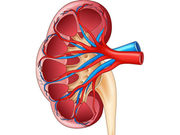AGEs improve RFL prediction in American-Indians with type 2 diabetes
TUESDAY, Sept. 13, 2016 (HealthDay News) — For American-Indians with type 2 diabetes, advanced glycation end products (AGEs) are associated with renal function loss (RFL), according to a study published online Sept. 8 in Diabetes.
Pierre-Jean Saulnier, M.D., Ph.D., from the Phoenix Epidemiology and Clinical Research Branch, and colleagues used data from a six-year clinical trial to examine correlations of AGEs with RFL and its structural determinants in American-Indians with type 2 diabetes.
The researchers found that during a median follow-up of 8.0 years, 104 of 168 participants reached the RFL end point (≥40 percent decline of measured glomerular filtration rate from baseline). Each doubling of carboxyethyl lysine or methylglyoxal hydroimidazolone concentration correlated with RFL after multivariable adjustment (hazard ratios, 1.60 and 1.30, respectively). There were positive correlations for carboxyethyl lysine, carboxymethyl lysine, and methylglyoxal hydroimidazolone with cortical interstitial fractional volume (P = 0.03, 0.02, and 0.003, respectively). Negative correlations were seen for glyoxyl hydroimidazolone and methylglyoxal hydroimidazolone with total filtration surface per glomerulus (P = 0.01 and 0.046, respectively).
“AGEs improve prediction of RFL and its major structural correlates,” the authors write.
Two authors disclosed financial ties to PreventAGE Healthcare, where the assays of AGE were performed.
Full Text (subscription or payment may be required)
Copyright © 2016 HealthDay. All rights reserved.








